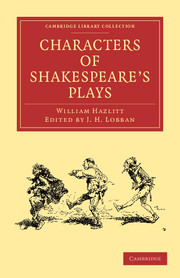Book contents
- Frontmatter
- Preface
- Contents
- Introduction
- Preface
- Cymbeline
- Macbeth
- Julius Cæsar
- Othello
- Timon of Athens
- Coriolanus
- Troilus and Cressida
- Antony and Cleopatra
- Hamlet
- The Tempest
- The Midsummer Night's Dream
- Romeo and Juliet
- Lear
- Richard II
- Henry IV
- Henry V
- Henry VI
- Richard III
- Henry VIII
- King John
- Twelfth Night; or, what you will
- The Two Gentlemen of Verona
- The Merchant of Venice
- The Winter's Tale
- All's Well That Ends Well
- Love's Labour's Lost
- Much Ado About Nothing
- As You Like It
- The Taming of the Shrew
- Measure for Measure
- The Merry Wives of Windsor
- The Comedy of Errors
- Doubtful plays of Shakespear
- Poems and Sonnets
- Notes
The Tempest
Published online by Cambridge University Press: 07 September 2010
- Frontmatter
- Preface
- Contents
- Introduction
- Preface
- Cymbeline
- Macbeth
- Julius Cæsar
- Othello
- Timon of Athens
- Coriolanus
- Troilus and Cressida
- Antony and Cleopatra
- Hamlet
- The Tempest
- The Midsummer Night's Dream
- Romeo and Juliet
- Lear
- Richard II
- Henry IV
- Henry V
- Henry VI
- Richard III
- Henry VIII
- King John
- Twelfth Night; or, what you will
- The Two Gentlemen of Verona
- The Merchant of Venice
- The Winter's Tale
- All's Well That Ends Well
- Love's Labour's Lost
- Much Ado About Nothing
- As You Like It
- The Taming of the Shrew
- Measure for Measure
- The Merry Wives of Windsor
- The Comedy of Errors
- Doubtful plays of Shakespear
- Poems and Sonnets
- Notes
Summary
There can be little doubt that Shakespear was the most universal genius that ever lived. “Either for tragedy, comedy, history, pastoral, pastoral-comical, historical-pastoral, scene Individable or poem unlimited, he is the only man. Seneca cannot be too heavy, nor Plautus too light for him.” He has not only the same absolute command over our laughter and our tears, all the resources of passion, of wit, of thought, of observation, but he has the most unbounded range of fanciful invention, whether terrible or playful, the same insight into the world of imagination that he has into the world of reality; and over all there presides the same truth of character and nature, and the same spirit of humanity. His ideal beings are as true and natural as his real characters ; that is, as consistent with themselves, or if we suppose such beings to exist at all, they could not act, speak, or feel otherwise than as he makes them. He has invented for them a language, manners, and sentiments of their own, from the tremendous imprecations of the Witches in Macbeth, when they do “a deed without a name,” to the sylph-like expressions of Ariel, who “does his spiriting gently;” the mischievous tricks and gossiping of Robin Goodfellow, or the uncouth gabbling and emphatic gesticulations of Caliban in this play.
The Tempest is one of the most original and perfect of Shakespear's productions, and he has shewn in it all the variety of his powers. It is full of grace and grandeur.
- Type
- Chapter
- Information
- Characters of Shakespeare's Plays , pp. 92 - 99Publisher: Cambridge University PressPrint publication year: 2009First published in: 1908

